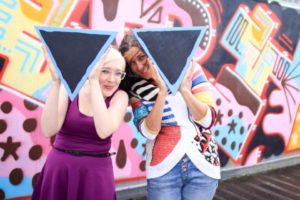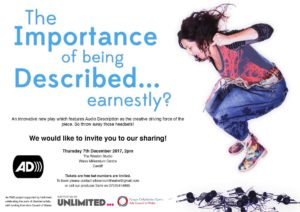
This is a BSL introduction to the background of Elbow Room Theatre Company
Hi Chloe and Sami great to meet you both, can you give our readers some background information on yourself please?
Sami: Hi, I’m Sami, I work as a performer and also as a qualified British Sign Language/English Interpreter. I have a longstanding passion for inclusion and accessibility in the Arts ever since training at a unique degree course at the University of Reading; Theatre Arts, Education and Deaf Studies.
Chloë: I’ve been performing professionally as an actor/musician for about 8 years, nearly exclusively in integrated or inclusive theatre. I’m registered blind so access in the arts is something I consider vital, and since receiving an Unlimited commission to explore creative uses of audio description I’ve become an AD consultant working with a huge variety of artists and companies across the UK and internationally.
Sami: Our aim is to create elbow room in the arts for marginalised groups of people. We’ll do this through a commitment to representation and equal access for performers and audiences. We produce new writing that explores creative access from the outset. ‘Elbow Room’ came to us when thinking about who has space and freedom in the arts and society, and who is fighting for it. We want to celebrate diversity and provide a platform for those, like us, who have to use their elbows occasionally. It’s important to continue discussions surrounding representation and diversity through the work we create and through collaborating with other companies, venues and the wider community.
You are both currently working on a new production called The Importance of Being Described… earnestly? We believe this new production presents a new form of Audio Description for audiences?

We want to prove that access really is for everyone and will be hosting a sharing of our research and development on Thursday December 7th at 2pm, in the Weston Studio, Wales Millennium Centre. We’re inviting any interested parties to book tickets via our website: www.elbowroomtheatre.com. Tickets are free but numbers are limited so grab ‘em quick!
Get the Chance works to support a diverse range of members of the public to access cultural provision. Are you aware of any barriers to equality and diversity for either Welsh or Wales based artists?
Sami: I honestly think Wales is behind. Both England and Scotland host disability led theatre companies, I would love to see more theatre that integrates access come over to Wales. It’s not that we don’t have any integrated theatre here or an unwillingness to learn, in fact, I find generally there is an inclusive attitude, it’s just that we need MORE. More choice, more variety for more people, more of the time.
Chloë: Having worked a lot in Wales and England I’d say there is definitely disparity in the amount of access and disability representation between them. As Sami so succinctly put, attitudes here are by and large willing, but somehow things just aren’t getting done at the level they should be. I think this is hugely to do with the relative scarcity of diverse or inclusive companies and work produced here, as well as a lack of programming of good examples from further afield. So often the argument from venues and companies with regards to access is ‘we’d love to, BUT…’ – we need to work together to combat the barriers faced by these venues and companies. One possible solution is the creative integration of access from the start of a project instead of tacking it on at the end. We need to enthuse writers and directors, as well as venues, to consider access from the outset. This can break down barriers from both sides.
Chloë: It would be in theatre and making theatre inclusive as a whole. We don’t just mean providing accessible performances, the entire experience needs to be welcoming, from booking tickets to getting to the theatre to interacting with venue staff. We need to be cultivating trust with diverse audiences in order to see them grow.
Sami : We love being in Cardiff, being in a city where there’s so much choice of theatre and cultural activity. The richness and quality of the Arts here really excite us and we want to see it all shared with as many people as possible. The last thing I saw that I really loved was the NT Live cinema screening of Angels in America.It took me two weekends to watch it as its very long! It was absolutely beautiful Andrew Garfield was in it. I loved him as an actor he was absolutely gorgeous. He is now playing a disabled person in the film Breathe, I saw him being interviewed on the Andrew Marr show recently. He was using language such as “Able Bodied” and ” Wheel Chair Bound”. I think these opportunities should be given to disabled performers or at the very least have some awareness of the social model of disability and right those wrongs. You are sat there watching cringing, going you are a person that has spent hours researching this role, you must know about the social model of disability, use your power , use your place in the world to be like no this is the correct terminology to use, be a role model!
Thank you for your time, we look forward to your sharing at the Wales Millennium Centre. Thank you for coming to have a chat with us for Get the Chance this afternoon.
Many thanks for your time
